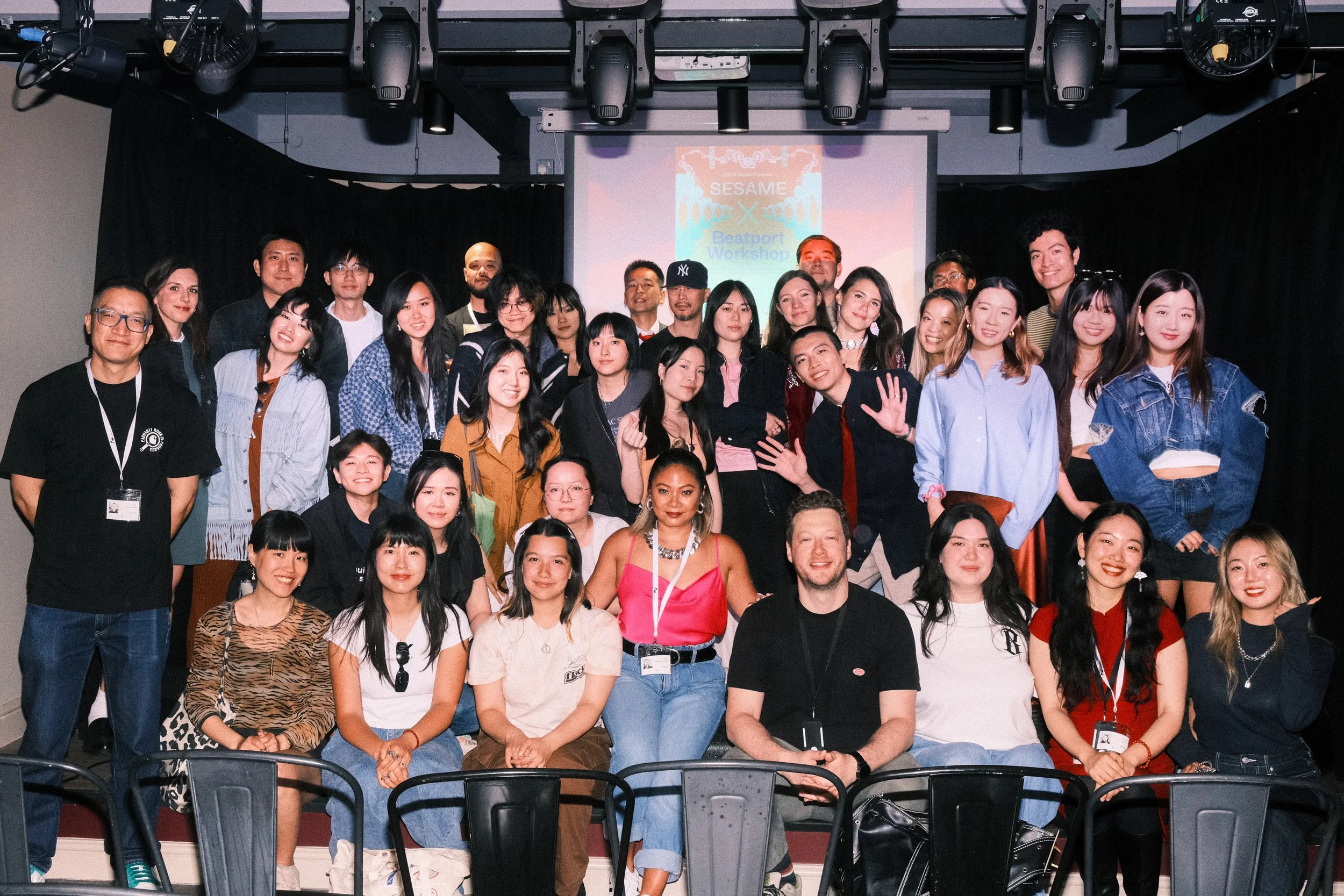FAC Insights: SESAME Mentorship by ESEA Music: Representation through community
FAC Insights is a forum for us to showcase and share long form pieces looking at various parts of the music industry and the society that shapes it. Pieces take the form of videos, interviews, discussions, articles and more.
This month, we are thrilled to hear about the Sesame Mentorship Scheme launched by ESEA Music.
ESEA Music, a community organisation, was established in 2021 by and for East and Southeast Asian (ESEA) professionals and artists in the UK music industry. With a mission to advance ESEA representation in the UK music industry, ESEA Music aims to provide a supportive, inclusive space for ESEA professionals and artists to thrive and find belonging. Its growing membership of over 500 members includes artists like Rina Sawayama and Jax Jones, and professionals at companies including Spotify, Universal Music and Sony Music.
A key initiative is the Sesame Mentorship Scheme, a programme launched in 2023 to provide professional support to ESEA members of the UK music industry. It is managed by a dedicated team including Rob Chung (FUGA), Lucinda Tse-Hall (BMG) and Aileen De La Cruz (songwriter/vocalist). Having recently rounded out its third successful year, the scheme continues to nurture ESEA professionals by facilitating meaningful conversations and career development opportunities.
Origins of Sesame
How did the Sesame mentorship scheme come to be?
Lucinda Tse-Hall (LT): Our work on Sesame started in 2022. Myself and Emma-Lee Moss (a musician, writer and fellow member of ESEA Music) started developing the idea for a scheme in response to younger members of ESEA Music asking for a way to receive career guidance from more established members of the group.
Our main aims for the scheme were to (i) facilitate a support system that promoted communication and positivity, leading to better mental and creative health; and (ii) push for further equality in the music industry. Mental health and intersectionality were considerable factors in our thinking, in the wake of the BLM movement, Stop Asian Hate and Covid.
We had two successful trial periods during which to hone our application and matching processes. We had industry veterans, such as Matt Tong (Ivor Novello Award winner / Algiers / formerly of Bloc Party) and Stacey Tang (RCA), offer their support as mentors.
What dynamics in the UK music industry have contributed to the formation of Sesame?
LT: Intersectionality is central to Sesame’s approach -- and a key strength of the scheme. Our cultures and backgrounds are intrinsically a part of our identity, particularly as first, second or even third generation immigrants to the UK. Whilst ESEA folks may have had mentors before, those mentors often may not have understood our particular experience as East and Southeast Asians and as under-represented minorities, in both the music industry and wider UK society.
We’ve also had applicants specifically ask for woman mentors. That intersectionality is still rare in mentors. For someone seeking mentorship, it can be comforting to know others before you have asked themselves: “Did people respond to me or my ideas this way because I’m ESEA, and/or because I identify as a woman?”
Have there been key experiences or moments that highlighted to you the need for a mentorship scheme like Sesame?
One experience is that of Sesame mentor and ESEA Music member Aileen de la Cruz. When Aileen was first getting signed as a recording artist, the label openly said they were ‘taking a risk’ because she was Asian. 20 years later, that statement still sticks with her. It made clear that, no matter her talent or work ethic, she was still being viewed through the lens of her ethnicity -- as though it made her less commercially viable. It was isolating, and she had no one to turn to who’d faced something similar.
That moment brought home how essential mentors are, especially those who understand the challenges of being underrepresented in music. Now mentoring younger artists herself, Aileen has seen how transformative it can be for someone to simply feel seen, supported, and guided. Mentorship isn’t just career advice – it’s about building resilience, confidence, and community.
Programme Design & Objectives
What is the format of the mentorship scheme?
Rob Chung: Mentors and mentees are paired up, and together commit to at least six hours of mentorship sessions (whether in person or online) over a three-month period. We have had a wide range of pairings, featuring artist managers, sound engineers, bookers, A&Rs, producers, songwriters, vocal coaches, marketing and publicists.
What are some key goals and targeted outcomes for those coming through the programme?
Aileen de la Cruz (ADC): Our goals for mentees and the wider ESEA Music community are centred on empowerment, visibility, and lasting change.
For the individuals we support, we are focused on fostering personal and professional development. We want mentees to feel confident in their creative identity and career path, equipped with critical skills - from songwriting and production to networking and pitching - to build authentic, sustainable careers in the creative industries. Our role is to help them build meaningful connections with mentors and peers, within a community that truly understands their cultural experiences and creative ambitions.
All of this feeds into a broader mission: improving access and representation. We aim to open doors to spaces, platforms, and networks that have historically underrepresented ESEA voices - and to support our mentees in navigating and challenging the systemic biases they may encounter. Ultimately, we want their work to be better seen, heard and celebrated.
What does a successful mentorship relationship look like within this program?
ADC: A successful mentorship relationship is empowering and mentee-led. It’s a space where mentees feel safe, heard and in control of their goals. Mentors listen actively, offer guidance without imposing, and support the mentee in shaping their own path. It’s a collaborative process based on the mentee’s needs and vision, not one-size-fits-all.
There’s mutual respect for lived experience, cultural background, creative expression and professional boundaries. Both mentor and mentee can openly discuss challenges, aspirations and identity without fear of judgement. Through honest reflection and constructive feedback, both can step out of their comfort zone and grow -- building confidence, resilience and clarity of purpose.
By affirming our ESEA identity, mentors can help mentees navigate industry spaces that may lack diversity, without compromising who they are.
Our mentorship relationships have also proven to last beyond the end of the programme. Our mentors aim to leave mentees with the tools, contacts and confidence to continue growing, and ideally to become mentors themselves one day.
Are there any testimonials to share from members of the scheme?
Anthony Lee (Marketing Consultant for Music, Arts, and Entertainment): I was grateful for the opportunity to be mentored by Stacey Tang (RCA). It’s rare to have access to someone so accomplished and exceptional - and even rarer when they share your lived experience as part of the ESEA community. Her understanding of those factors at play before you even step into a meeting, building or role, marked a real turning point in my career.
Having space to holistically discuss my experiences, ambitions, and approach to life was invaluable. Being able to align these with the pivotal steps and moments in Stacey’s journey gave me greater confidence and understanding about the industry. Stacey was not only knowledgeable but also kind, trustworthy and encouraging - mainstay qualities for building a sustainable future in music.
Our Sesame sessions helped prepare me for my future roles working with artists and managers and navigating label setups, and to see my skills and experiences as assets.
Fast forward a few years, my experience across the spectrum of music from grassroots to global campaigns has led me to launch my own company, Clever Leaf Creative, where I continue to support artists and teams on strategic marketing and project management.
What are Sesame’s aspirations and long-term goals?
We’re currently in early conversations with The Ronnie Scott’s Charitable Foundation and the BRIT School about future partnerships.
Beyond supporting individual mentees, our work aims to uplift the broader ESEA community. We want to amplify diverse ESEA stories and shift the narrative around what ESEA identity can look and sound like. This helps build safe, culturally affirming creative spaces and fosters meaningful connections across generations and disciplines.
We’re also committed to driving equity and inclusion in the industry. That means advocating for systemic change within creative institutions, pushing decision-makers to support ESEA artists through equitable funding, commissions, and fair opportunities.
Our long-term vision is to build a lasting legacy of leadership -- not just nurturing artists, but developing future leaders, mentors and change-makers who will ensure that ESEA voices don't just exist in the arts and media but actively shape its future.
Do you have any learnings from Sesame to share with the music industry or other initiatives with similar goals?
ADC: One key lesson is that representation must go beyond optics - it needs to be backed by meaningful, structural support. Visibility matters, but without access to resources, networks, and decision-making power, it risks feeling tokenistic. That’s where mentorship and community-driven schemes come in: they help bridge that gap with tangible support and long-term development.
We’ve also seen that cultural understanding in the industry is still lacking. Many underrepresented artists, including myself, have had to explain or justify our identity and artistry in ways others haven’t. This creates a psychological burden - one that mentorship can help relieve — but also signals a deeper need for industry-wide education, accountability and inclusive leadership.
Finally, the most effective initiatives we’ve seen are those that centre the voices of the communities they serve, rather than speaking on their behalf. That means co-creation, listening, and continually evolving based on feedback. It’s not enough to open the door — we need to change the room, too.
Words by Cordelia Lam

